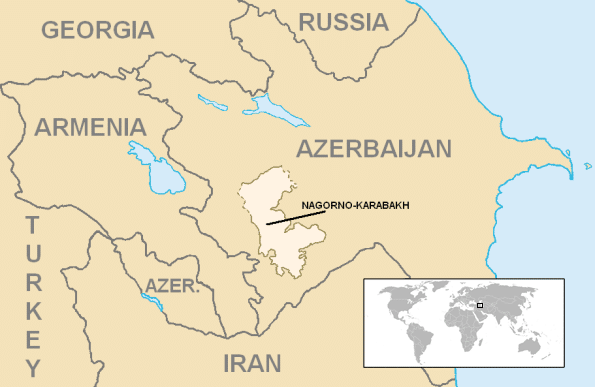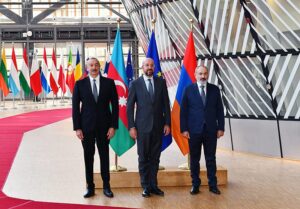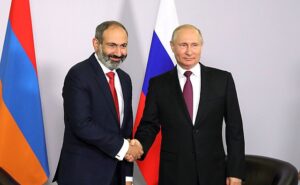Photo: Wikimedia Commons
The Nagorno-Karabakh region, which lies close to both Armenian and Azerbaijan, has been under severe pressure ever since the end of the Second Nagorno-Karabakh war in 2020. The region gained renewed relevance in December 2022, when Azerbaijan established a blockade on the road from Nagorno-Karabakh to Armenia. Recently, this blockade has been causing a deteriorating humanitarian situation in the region. This article discusses the alarming events in Nagorno-Karabakh, including their background and their possible outcomes.
What are the roots of the current Nagorno-Karabakh tensions?
Nagorno-Karabakh, which is inhabited mostly by ethnic Armenians, is internationally mostly recognised as part of Azerbaijan, following the borders of the various Soviet Union Republics. However, as most inhabitants identify themselves as Armenian and the region is locally governed by Armenian authorities, Armenia also claims the region. From 1988 to 1994 and in 2020, these ethnic tensions led to two full-scale bloody wars. Ever since, Armenia and Azerbaijan have been part of a peace process guided by Russia, including a ceasefire which is meant to be enforced by Russian peacekeepers. However, the ineffectiveness of these measures have been painfully evident as deathly ceasefire violations have been rule rather than exception. In recent months, Azerbaijan has virtually unrestrictedly blocked the Lachin Corridor, the main access road connecting Nagorno-Karabakh with Armenia and the rest of the world. This illegal blockade began in December 2022 with Azerbaijani staged ‘eco-activists’ blocking the road. They left after four and a half months, at the end of April 2023, when Azerbaijani authorities started consolidating the blockade by seizing ground around the corridor, installing a military outpost which prevents relief, and installing a border checkpoint.
International actors, such as the Russian peacekeepers, the International Court of Justice, and the European Court of Human Rights have called for Azerbaijan to ensure the free movement of people and goods in Nagorno-Karabakh.
Human Rights organisations are particularly concerned about the blockade because it poses several alarming risks: potential expulsion of local Armenians from their homeland, an evident risk of genocide, and a severe shortage of basic needs and essential emergency resources due to the blocked importation of food, fuel, and medicine. This dire situation has led to a humanitarian crisis, with residents trapped in the region facing closed schools, separated families, and deliberately restricted services by Azerbaijan.
The EU and the US have been trying to mediate in the conflict through civilian missions and peace talks. However, Armenia and Azerbaijan have repeatedly found themselves in a stalemate, for instance when their representatives negotiated peace provisions in Washington and Brussels. The lack of progress is also caused by highly ineffective Russian peacekeeping forces, which makes some wonder whether Russia even desires a peaceful outcome of the conflict.
Why has the humanitarian situation worsened lately?
In recent weeks the situation has been deteriorating as Azerbaijan has been blocking all supplies, including those of the International Committee of the Red Cross, from having access to Nagorno-Karabakh. This leads the 120,000 inhabitants of Nagorno-Karabakh without external assistance, resulting in deaths and mass protests.
While the region has already been facing hardships for a longer period of time, recent developments have reached new levels of concern. For instance, on the 29th of July, Azerbaijani authorities halted the transfer of critically ill patients from Nagorno-Karabakh to Armenia, after a patient who was travelling with the Red Cross, seeking treatment, was arrested by Azeraijani forces on charges of war crimes.
The International Committee of the Red Cross (ICRC) has called for “the relevant decision makers to allow the ICRC to resume its essential humanitarian operations in the area,” as it has not been able to reach the people who are relying on humanitarian aid. “The civilian population is now facing a lack of life-saving medication and essentials like hygiene products and baby formula,” the Red Cross, which is urging for a “humanitarian consensus”, stated.
In addition, the European Union has stated to be “deeply concerned about the serious humanitarian situation affecting the local population” in Nagorno-Karabakh.
What’s next?
Unlike the Armenian authorities in Nagorno-Karabakh, the Armenian government in Yerevan has showed willingness to recognise Nagorno-Karabakh as Azerbaijani territory, as they are experiencing pressure from Azerbaijan, Russia, the EU, and the US to make compromises and sign a peace treaty. However, they are also facing strong domestic pressure to not make any compromises, due to patriotic and nationalist sentiments, stemming from the remembrance of the Nagorno-Karabakh wars. With the blockade of Lachin, Azerbaijan seems to want to put even more pressure on these tensions and negotiations, and isolate the Yerevan government from the authorities in Nagorno-Karabakh. This instability strengthens Azerbaijan’s negotiating position against the Pashinyan government in a highly problematic way, as it is unacceptable to provoke a humanitarian disaster for bargain power at the negotiating table.
Azerbaijani authorities have denied blockading Nagorno-Karabakh and claim that they are offering to provide aid through a different road. The president of the unrecognised Armenian local government in Nagorno-Karabakh, who fears becoming dependent on Azerbaijan, responded to these claims saying that “Azerbaijan created this crisis and cannot be the solution to it.” The EU also stated that they are aware of these Azerbaijani offers but that they “should not be seen as an alternative to the reopening of the Lachin corridor.”
Although the EU has called out the Azerbaijani authorities, its current stance towards the conflict is unlikely to be effective. The EU has made Azerbaijan one of its crucial trade partners by closing key gas deals to replace its dependency on Russian gas. Despite this trading partnership, the EU should impose targeted sanctions and concrete ultimatums on Azerbaijan. The international agreements and human lives which are threatened by the humanitarian conditions in Nagorno-Karabakh should be deemed more important than gas deals.
The importance of a peaceful outcome to the conflict cannot be overemphasised as the current situation in Nagorno-Karabakh poses immense risks. For instance, there is a growing threat of famine in the region, and the Armenian Prime Minister Pashinyan has said that a new war with Azerbaijan is “very likely” as long as there is no agreed peace treaty. Therefore, these disastrous outcomes should be prevented by all parties involved at all costs. This implies prioritising human lives over strategic political decisions and prioritising concrete action over ‘voicing concerns’.
Written by Luna Sent



